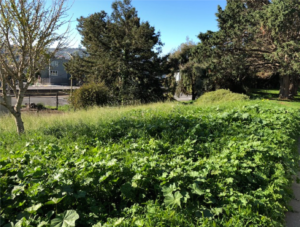The quarterly meeting of the Glen Park Association took place on Thursday, January 17, at the Glen Canyon Park recreation center. Here are some highlights.
Supervisor Mandelman:
Rafael Mandelman presented a legislative update and engaged in a Q & A for the first time since being sworn in as District 8 Supervisor. While declaring this is the best job he’s ever had, he also said, “Every single problem in the district becomes your problem.”
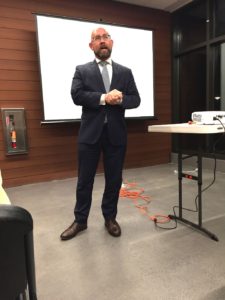
His priorities remain mental health, drug addiction and homelessness. “Parts of our district and the city are in pretty bad shape,” he said.
SB 1045 has been passed, which expands the conditions under which gravely disabled individuals can be placed under conservatorship. This legal tool will address the situation of a limited number of cases.
The number of involuntary (5150) holds at ZSFGH due to meth abuse and addiction are increasing. The supervisor has asked the mayor to reconvene the long dormant meth task force. (Online references to it are from 2005.) The looming problem is the lack of a range of treatment facilities and infrastructure to meet the needs of the growing needy population. There also needs to be better communication and coordination among the various social and care agencies.
Incredible traffic congestion continues to plague the city. Mandelman is working with SFMTA to improve the public transit system.
The StreetTreeSF program, under which the city has reassumed responsibility for street tree maintenance, has been having a slow rollout. There’s no funding for planting and caring for new trees to expand and replace the tree stock. Mandelman will be working on this through the regular budget process.
In addition to the Budget and Finance Committee, he’s the chair of the Public Safety and Neighborhood Services Committee.
Some of the many issues covered in Q & A:
There was a lot of group discussion about the $500 million windfall from the state to the City of San Francisco. The city had been overpaying into education funding under Prop 98 for two years. After set-asides for other public services, $185 million will remain as discretionary funds for the city. Thirty-five million dollars will go to the schools. Some said all the money was meant for education and all of it should go to the city schools.
Mandelman wants to make sure that Prop. G, the teacher salary increases funded through a parcel tax, survives. It was approved by a simple majority and is currently in litigation over the issue of whether it required a two-thirds vote to pass.
He also cited the need for funding his priority of homelessness relief, especially shelter beds, and brick and mortar facilities, such as the homeless veterans’ housing on Treasure Island. Proposition C, the $300 million Gross Receipts Tax for Homelessness Services Initiative that was passed in November, is also in litigation over whether the measure really needed a two-thirds majority.
The approvals process for residential and business property, including affordable housing, needs to be streamlined. Mandelman agrees that the system is too slow: Small businesses have trouble getting permits to move into vacant properties. Conditional use permits can take seven to ten months to work their way through the approvals process. He is looking for ways to move approvals along, especially for projects that have no opposition.
On the other hand, he cites abuses where houses get demolished without approval, and he’s cosponsoring a bill to stop demolitions. He supports a size limit on building one-family houses in favor of two or three units within the envelope. He would like to see fewer discretionary decisions and more objective standards.
Regarding SB50 sponsored by Sen. Wiener, Mandelman is torn. “We need tens of thousands of houses. Yet I remain not loving the idea of Sacramento saying what building heights are going to be.”
Contact the Supervisor:
Erin.Mundy@sfgov.org (legislative aide); or
Elk/Sussex Crosswalk
Gabriel Ho and Casey Hildreth of SFMTA explained the proposal to provide a safe crosswalk at the stairs into Glen Canyon Park, at the corner of Elk and Sussex. It’s been in the works since 2015, when many ideas were bandied about.
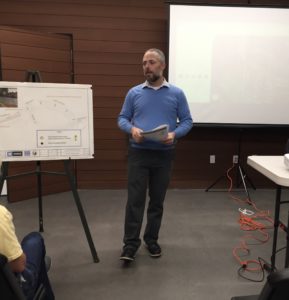
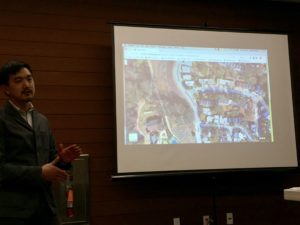
The solution preferred by SFMTA (see graphic) would feature flashing beacons, speed reduction, and curb ramps. The most controversial element is the removal of the equivalent of six parking spaces between Arbor and Sussex along the canyon side. There, parked cars are a visual obstruction between the driver’s line of sight and pedestrians. The Elk/Sussex intersection is very challenging, as Elk street both curves to the right and undulates as it descends along the park.
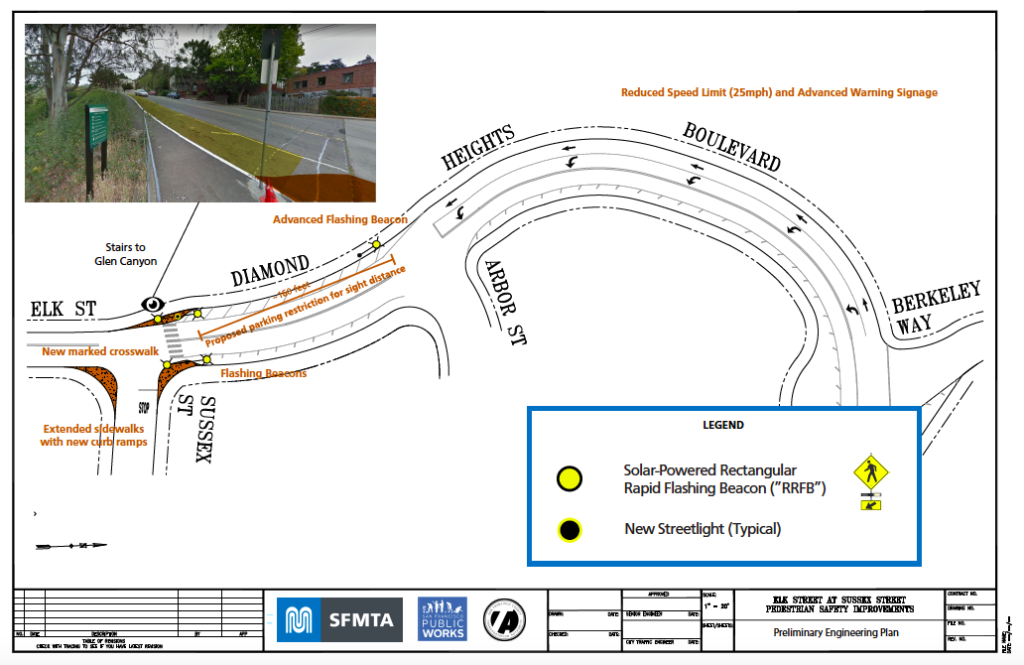
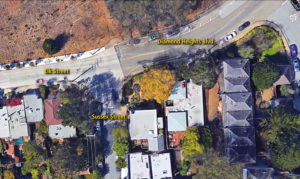
The key factor in the plan is to make sure the crossing is safe. Fortunately, there have been no reported collisions at the location. Even though more people are using the renovated park facilities, SFMTA contends that there is adequate parking on nearby streets to absorb the additional demand. For example, Sussex has substantial curb space with few driveways.
Overall, after the extended explanation by Ho and Hildreth, people seemed to agree with the plan. It will go through engineering approvals and a public comment period. Construction is expected to begin later this year, and completion by the end of 2019.
Association Business
Each January, the winter GPA meeting holds its election of officers. With the exception of one replacement, all current officers were re-elected:
President: Scott Stawicki
Vice President: Stephany Wilkes
Treasurer: Dennis Mullen
Recording Secretary: Heather World
Corresponding Secretary: Bonnee Waldstein
Membership Secretary: Adrienne Lacau (Hilary Schiraldi stepping down)
Stawicki announced that Michael Rice, former Glen Park Association president of twelve years, is moving out of Glen Park and from the board. Everyone thanked Michael for his long service and devotion to our neighborhood.
In addition, throughout 2018, an ad hoc committee of the board worked to review and revise the bylaws of the Glen Park Association. The bylaws hadn’t been updated in at least ten years, and new technology has changed board and association functions over time. Among the revisions are: Decision making by the board and membership will consistently be by majority vote; some officers’ duties were clarified; statements regarding ethics were added.
The members present at the meeting voted to approve the bylaws. They will be posted on the Association website soon.
Greenway and Arlington/San Jose Update
Last year was a very productive one on the Greenway project. Volunteers planted seventeen trees and 36 acorn plots, as well as two demonstration beds. Throughout the year, they were watered and nursed along and only one tree was lost. Water supply continues to be a challenge, but the Greenway is close to getting meters in the three major segments.
This year the volunteers will focus on improving the trail between Brompton and Chilton. Greenway chair Nicholas Dewar says that, if funding is secured, it will be a permeable trail with a surface that resists erosion and provides a suitable surface for pedestrians. A boundary survey of the Greenway is also planned.
Here are some images of plants and people thriving on the Greenway (photos courtesy of Scott Stawicki and Nicholas Dewar):
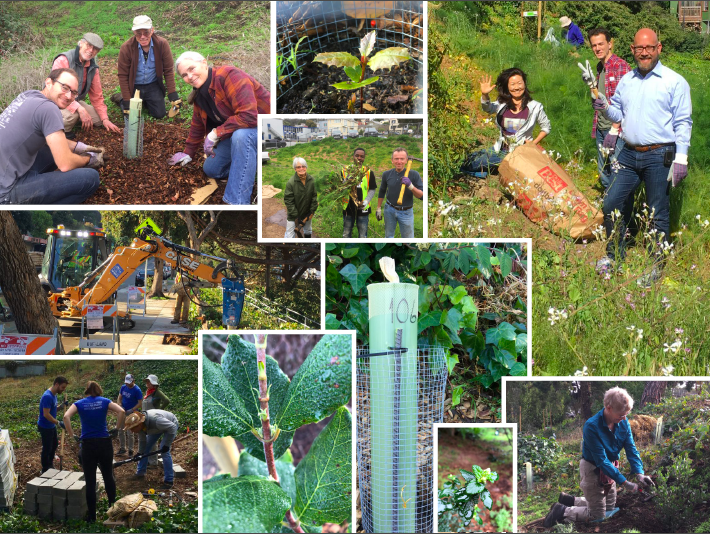
Another continuing major project is the clean-up and beautification of the Arlington/San Jose footpath and green space.

